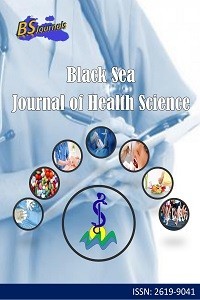Covid-19 Phobia and Psychological Well-Being in Peritoneal Dialysis Patients during the Pandemic Process
Covid-19 Phobia and Psychological Well-Being in Peritoneal Dialysis Patients during the Pandemic Process
___
- Arora A, Jha AK, Alat P, Das SS. 2020. Understanding coronaphobia. Asian J Psychiatry, 54: 102384.
- Arpacı I, Karataş K, Baloğlu M. 2020. The development and initial tests for the psychometric properties of the COVID-19 Phobia Scale (C19P-S). Personal Individual Differen, 164: 110108.
- Barutcu Atas D, Aydin Sunbul E, Velioglu A, Tuglular S. 2021. The association between perceived stress with sleep quality, insomnia, anxiety and depression in kidney transplant recipients during Covid-19 pandemic. PloS one, 16(3): e0248117.
- Beydoğan Tangör B, Curun F. 2016. Indıvıdual dıfferences as predıctors of psychologıcal well-beıng: authentıcıty, self-esteem and traıt-anxıety. J Res Educ Teach, 5(4): 1-13.
- Blanco C, Wall MM, Olfson M. 2020. Psychological aspects of the COVID-19 pandemic. J General Inter Med, 35(9): 2757-2759.
- Bonenkamp AA, Druiventak TA, Van der Sluijs AVE, Van Ittersum FJ, Van Jaarsveld BC. 2021. The impact of COVID-19 on the mental health of dialysis patients. J Nephrol, 34(2): 337-344.
- Deboni LC, Neermann EMV, Calice-Silva V, Hanauer MA, Moreira A. 2020. Development and implementation of telehealth for peritoneal dialysis and kidney transplant patients monitoring during the COVID-19 pandemic. J Bras Nefrol, 43(3):422-428.
- Diener E, Wirtz D, Tov W, Kim-Prieto C, Choi D, et al. 2010. New well-being measures: Short scales to assess flourishing and positive and negative feelings. Soc Indic Res, 97(2):143-156.
- Doğan U, Kaya S, Eren D. 2016. High school students’ risk taking behaviors and its relation with life satisfaction and psychological well-being. Turkish Stud, 11: 953-964.
- Dubey S, Biswas P, Ghosh R, Chatterjee S, Dubey MJ, Chatterjee S, Lahiri D, Lavie CJ. 2020. Psychosocial impact of COVID-19. Diabetes Metab Syndr, 4(5): 779-788.
- Hiçdurmaz D. 2005. Coping strategies of hemodialysis and continuous ambulatory peritoneal dialysis (CAPD) patients. Master Thesis, Hacettepe University, Institute of Health Sciences, Department of Psychiatric Nursing, Ankara, Turkey, pp. 128.
- Kermen U, Tosun Nİ, Doğan U. 2016. Social phobia as predictor of life satisfaction and psychological well-being. EKUAD, 2(1): 20-29.
- Keskin E, Çelik S, Köstekli S. 2021. Surgical process anxıety from the perspective of neurosurgery patients ın the covid-19 pandemic. Kocaeli Med J, 10(1): 72-84.
- Liu X, Luo WT, Li Y, Li CN, Hong ZS. 2020. Psychological status and behavior changes of the public during the COVID-19 epidemic in China. Infect Diseases of Poverty, 9: 1-11.
- Michaels MG, La Hoz RM, Danziger-Isakov L, Blumberg EA, Kumar D, et al. 2020. Coronavirus disease 2019: implications of emerging infections for transplantation. Am J Braz J Nephrol, 20(7): 1-5.
- Telef BB. 2013. the adaptation of psychological well-being into Turkish: A validity and reliability study. HU J Educat, 28(3): 374-384.
- Telef BB, Uzman E, Ergün E. 2013. Examine the relation between psychological well-being and values in teacher candidates. Turkish Stud, 8: 1297-1307.
- Toprak Celenay S, Karaaslan Y, Mete O, Ozer Kaya D. 2020. Coronaphobia, musculoskeletal pain, and sleep quality in stay-at home and continued-working persons during the 3-month Covid-19 pandemic lockdown in Turkey. Chronobiol Inter, 37(12): 1778-1785.
- Yang Z, Dong J. 2020. Operational considerations for peritoneal dialysis management during the COVID-19 pandemic. Adv Chronic Kidney Dis, 27(5): 442–446.
- Williamson EJ, Walker AJ, Bhaskaran K, Bacon S, Bates C. 2020. Factors associated with COVID-19-related death using. Open SAFELY Nature, 584: 430–436.
- Wong AHK, Pittig A. 2020. Costly avoidance triggered by categorical fear generalization. Behav Res Ther, 129: 103606.
- WHO. 2020. World Health Organization, Health topics – Coronavirus Geneva: WHO. URL: https://www.who.int/health-topics/coronavirus (accessed date: January 02, 2021).
- Yerram P, Misra M. 2020. Home dialysis in the coronavirus disease 2019 Era. Adv Chronic Kidney Dis, 27(5): 442-446.
- Yeter HH, Gok Oguz E, Akcay OF, Karaer R, Yasar E. 2021. The reliability and success of peritoneal dialysis during the COVID‐19 pandemic. In Seminars Dialysis, 34(2): 147-156.
- Zautra AJ. 2006. Emotions, stress and health. Oxford University Press, Oxford, UK, 1st ed., pp. 328.
- Yayın Aralığı: Yılda 4 Sayı
- Başlangıç: 2018
- Yayıncı: Cem TIRINK
Factors Affecting Morbidity and Mortality in Gastrectomy Cases with Splenectomy
Tolga KALAYCI, Ümit Haluk İLİKLERDEN, Çetin KOTAN
Merve Şeyda KARAÇİL ERMUMCU, Satı GÜREL, Özge MENGİ ÇELİK
COVID-19 Pandemisinde Yoğun Bakım Hastalarında Basınç Yaralanmaları
Bilge TEZCAN, Şule ALPAR ECEVİT
Etiology and Histopathology of Alzheimer’s Disease and Current Approaches
Fikri ERDEMCİ, Fırat AŞIR, Fatih TAŞ
Transient Atrioventricular Complete Block Rarely Detected in a Patient with COVID-19: A Case Report
Murat DUYAN, Serhat GÜNLÜ, Ali SARIDAŞ, Yıldızhan SOLAÇ, Mehmet DURGUN
İshal ve Deri Bulguları ile Başvuran Bir Atipik COVID-19 Olgusu
Nur CANCAN GÜRSUL, Sevil ALKAN, Servan VURUCU
Does Beverage Consumption Affect Sleep Quality?
Özge ESGİN, Ayşe Özfer ÖZÇELİK
Hemşirelik Eğitiminde Bir Simülasyon Oyunu: “Klinik”
Fatmanur SÖKÜCÜ, Sedat YİĞİT, Emine PEKTAŞ, Hatice MUTLU ALBAYRAK, Peren PERK YÜCEL, Serkan USGU, Yavuz YAKUT
